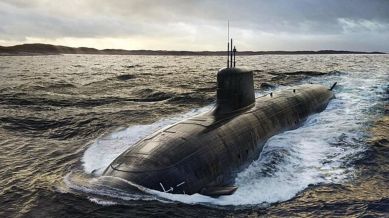Stay updated with the latest - Click here to follow us on Instagram
US launches review of AUKUS submarine deal; Australia confident pact will proceed
US Defence Secretary Pete Hegseth has talked about the importance of ensuring maximum military readiness and pressing allies to contribute fully to collective defense.

The United States has initiated a formal review of the AUKUS submarine agreement with Australia and the United Kingdom to ensure it aligns with the Trump administration’s “America First” priorities, according to a US defence official cited by the BBC. “The department is reviewing AUKUS as part of ensuring that this initiative of the previous administration is aligned with the President’s America First agenda,” the official said.
US Defence Secretary Pete Hegseth has talked about the importance of ensuring maximum military readiness and pressing allies to contribute fully to collective defense.
monthly limit of free stories.
with an Express account.
The review will be led by Elbridge Colby, a senior Pentagon official and critic of the deal, who had previously questioned why the US would part with what he called the “crown jewel” of its defense technology at a time of heightened global tensions.
Australia responds
Australia has responded with calm, expressing confidence that the pact remains intact. Defence Minister Richard Marles told ABC Radio Melbourne on Thursday that the deal is crucial to Australia’s long-term security needs. “I’m very confident this is going to happen,” Marles said. “You just need to look at the map to understand that Australia absolutely needs to have a long-range submarine capability.”
Marles said that it is not a surprise for a new administration to reassess such a major agreement. “This is a multi-decade plan. There will be governments that come and go and I think whenever we see a new government, a review of this kind is going to be something which will be undertaken,” he said.
What is AUKUS?
Signed in 2021 under then-President Joe Biden, the AUKUS pact is a trilateral security agreement aimed at countering China’s growing influence in the Indo-Pacific. Under the deal, Australia will acquire nuclear-powered submarines with technology shared by the US and UK, becoming only the second country after Britain to receive such access from Washington.
The plan involves Australia purchasing up to three second-hand Virginia-class submarines from the US starting in the early 2030s, with options for two more. Eventually, Australia and the UK will co-develop a new AUKUS-class submarine, with production shared between the two countries.
The deal is valued at $368 billion is Australian dollars (US$239 billion) over three decades and is expected to generate thousands of manufacturing jobs in both nations.
In 2025, Australia is scheduled to make a $2 billion payment to help upgrade US submarine shipyards. The first $500 million tranche was paid earlier this year during a visit by Marles to Washington.
Production and spending concerns
The US review will also examine the production rate of Virginia-class submarines, which have fallen behind schedule. Colby and other officials have expressed concerns about whether the US can meet its own fleet demands while also supplying submarines to Australia.
“It is important that those production and sustainment rates are improved,” Marles said.
Meanwhile, Australia is under pressure from Washington to increase its defense spending from 2% to 3.5% of GDP.
Prime Minister Anthony Albanese has committed to raising it to 2.3%, citing capability needs rather than percentage targets. He is expected to meet President Donald Trump at the upcoming G7 summit in Canada to discuss both AUKUS and defense burden-sharing.
An Australian government spokesperson told the BBC that such reviews are natural for a new administration, noting that the UK had also recently completed its own evaluation of the pact. There is “clear and consistent” support for the deal across the “full political spectrum” in the US, they said.
The UK Ministry of Defence echoed this sentiment, calling AUKUS a “landmark security and defence partnership” and “one of the most strategically important partnerships in decades.”
The AUKUS pact has drawn criticism from China, which accuses the trilateral alliance of destabilising the region and stoking an arms race. Analysts warn that any sign of US withdrawal could be seen as a strategic win for Beijing.
(With inputs from BBC, Reuters)